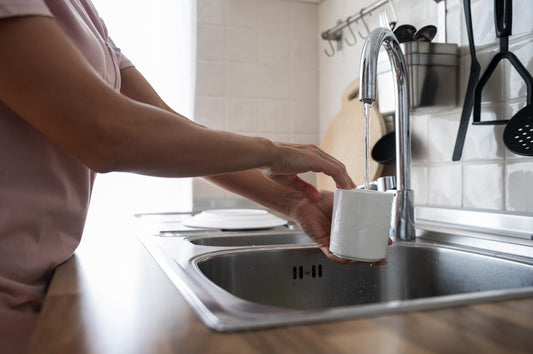The importance of water to human life is a universally accepted fact, and so is the need for clean, safe, and pure drinking water. Water filtration plays an indispensable role in providing us with such drinking water. Yet, misconceptions and myths surround water filtration, making it seem more complex or less effective than it truly is. This article serves to debunk five of the most common myths about water filtration.

Image by Freepik
The Importance of Water Filtration
To appreciate the myths and truths we're about to explore, it's essential to understand the critical role water filtration plays. The primary purpose of filtration is to remove or reduce the concentration of contaminants—ranging from harmful bacteria and viruses, to heavy metals and chemical residues. This results in cleaner, safer water that's better for our health and more pleasant to drink.
Myth 1: Bottled Water is Always Better
The Prevalence of this Myth
The first myth we're tackling is a widely held belief: that bottled water is invariably superior to tap or filtered water. The convenience and marketing strategies of bottled water companies contribute to this notion.
The Reality of Bottled Water
However, the truth is that bottled water isn't inherently safer, cleaner, or healthier than tap or filtered water. Regulatory standards for bottled and tap water are generally comparable. Moreover, it's not uncommon for bottled water to be sourced from municipal supplies—that's right, it's often just tap water that's been filtered and packaged.
Environmental Impact of Bottled Water
Furthermore, we can't overlook the environmental implications of bottled water. The production and disposal of plastic bottles contribute significantly to environmental pollution and resource depletion. On the other hand, using a water filter at home and a reusable bottle when on-the-go is a more eco-friendly choice.

Image by pch.vector on Freepik
Myth 2: Filtered Water Removes Essential Minerals
The Prevalence of this Myth
The second myth proposes that water filtration removes all minerals from water, including those essential for human health. This myth can make water filtration seem like a trade-off between removing harmful substances and retaining beneficial ones.
The Science Behind Water Filtration
While it's true that some filtration methods can remove minerals, the extent and range vary greatly depending on the specific type of filter. For example, reverse osmosis can remove a broad range of minerals, but activated carbon filters typically leave mineral content unaffected.
Essential Minerals: Primary Sources
Most importantly, we must remember that water isn't a significant source of minerals in a balanced diet. The primary sources are the foods we eat—fruits, vegetables, grains, dairy, and meat. Therefore, any minor reductions in mineral content due to filtration aren't likely to impact your overall nutrient intake.
Myth 3: All Water Filters are the Same
The Prevalence of this Myth
The third myth simplifies the diverse world of water filters into a one-size-fits-all solution. Many people believe all water filters function the same and remove the same contaminants.
Understanding the Different Types of Water Filters
In reality, there's a wide array of water filters, each with its specific mechanisms and purposes. These range from activated carbon filters, which are great for removing chlorine and improving taste, to reverse osmosis systems that can remove a broader range of contaminants, including certain metals and nitrates.
How to Choose the Right Water Filter
The best water filter for you depends on your specific needs and water quality. Understanding the types of contaminants in your water supply (which can often be found in a water quality report from your local water provider) can help you choose the most suitable water filter.
Myth 4: Water Filtration is Unnecessary in Developed Countries
The Prevalence of this Myth
The fourth myth assumes that in developed countries, where water treatment facilities are common, additional water filtration at home is unnecessary.
The Hidden Truth about Water Quality in Developed Countries
While it's true that developed countries generally have safe drinking water standards, there can still be issues. For example, water can pick up contaminants on its journey from the treatment plant to your home. Aging infrastructure can lead to issues such as lead contamination, a problem that has been highlighted in recent years.
The Role of Regular Testing and Filtration
Therefore, regular testing of your home's water and the use of appropriate water filtration systems can ensure that your water is as clean and safe as possible.
Myth 5: Water Filters are High Maintenance
The Prevalence of this Myth
Our final myth is the idea that water filters require constant, complex maintenance, discouraging many potential users from adopting them.
Demystifying Water Filter Maintenance
While it's true that filters need to be replaced periodically, the frequency and process depend on the specific model and your water usage. Many filters can last several months, and the replacement process is often simple and straightforward.
The Rise of User-friendly Water Filters
In fact, many modern water filters are designed with user-friendliness in mind. They may have indicators for when a filter change is due, or even smartphone connectivity to remind you when it's time for maintenance!

Image by brgfx on Freepik
Conclusion
In debunking these myths, we hope to have shed some light on the realities of water filtration. Clean, safe water is a fundamental necessity, and filtration is an effective, convenient, and eco-friendly way to achieve it in our daily lives.
FAQs
Does water filtration make water taste better?
Yes, water filters remove contaminants that can impart unpleasant tastes and odors, often resulting in water that's more appealing to drink.
Can I filter hot water?
It's generally best to filter cold water. Hot water can damage some filters and decrease their effectiveness.
Are water filters expensive?
The initial cost of water filters varies greatly depending on the type and model. However, when considering the cost of bottled water or potential health costs associated with contaminated water, they can be a cost-effective solution.Does filtered water need to be refrigerated?
Not necessarily. However, refrigerating filtered water can enhance its taste, especially during hot weather.
How often should I change my water filter?
The frequency of change depends on your specific filter and how much water you use. Many manufacturers provide guidelines, but typically, filters should be changed every 2-6 months.
Featured Image by katemangostar on Freepik
People also search for Hot Water Dispensers




